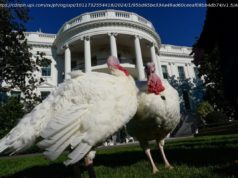A new line of punditry is bubbling up among the president’s followers online: It was a positive thing that the Russians hacked the 2016 election.
Updated at 5:28 p.m. ET
On Wednesday morning, in the midst of yet another contentious news cycle dominated by coverage of Russian election meddling, I tweeted a kind of thought experiment: “If Trump & co. just pivoted to ‘Aren’t you glad Russia helped us defeat Hillary Clinton?’ would there be any serious blowback from his base?”
The question was rhetorical. The answers that began trickling in were not.
“No,” said Cassandra Fairbanks, a writer at the right-wing news and conspiracy website Gateway Pundit (and a former Sputnik employee). “I mean, I would be cool with it. I’m already there. If Russia was involved we should thank them.”
“No,” responded another self-identified Trump voter. “Hillary is a greater threat to our Republic.”
Several people pointed me to Jacob Wohl, a Trump booster with a large Twitter following, who had mused just hours earlier, “If Russia assists MAGA Candidates on the internet in this year’s midterms, that’s not the end of the world.” And others re-upped a C-SPAN clip from the day before in which a caller identified as Mary Lou from Connecticut said, “I’ll try not to sound too awful, but I want to thank the Russians for interfering with our election to stop Hillary Clinton from becoming president. That woman has got illusions of grandeur.”
These are anecdotal cases, of course. As Phillip Bump notes in The Washington Post, there hasn’t been much polling data measuring how Americans feel about foreign governments interfering in United States elections; up to now, disapproval has simply been presumed. The polls that are available suggest that most Trump supporters don’t believe there was any Russian election interference, and if there was, it had no effect on the race.
But as Washington braces for special counsel Robert Mueller to release the findings of his investigation, this new line of punditry bubbling up in the pro-Trump social-media conversation is worth taking seriously.
Trump has benefitted enormously throughout his political rise from the efficiency with which his supporters circulate talking points that excuse his bad behavior, or neutralize his latest scandal, or explain away the discrepancies in his ever-shifting rhetoric. Sometimes, these talking points originate with the president himself, his early-morning Twitter rants doubling as messaging memos to the #MAGA army. Other times, they filter down from high-profile talking heads like Sean Hannity or the hosts of Fox & Friends. Often, though, they are beta-tested at the fringes, where the ideas seem outlandish and troll-y at first, before becoming more widely adopted once circumstances dictate.
Skimming #MAGA Twitter, it’s easy to see the outlines of the pro-Russian-meddling argument emerging: America interferes in other countries’ elections, so it can’t be that bad; exposing Democrats’ hacked emails was a victory for transparency; keeping Clinton out of office was so urgent and important that it warranted some foreign intervention.
If it seems far-fetched that serious people would deploy such an argument, consider the Trump apologists’ trajectory up to this point in the Russia saga. When the term “collusion” first entered the political conversation in the wake of the 2016 election, the initial response was to dismiss the idea outright. It was popular in Washington for Republicans to crack jokes about how Trump’s disorganized campaign “couldn’t even collude with itself,” let alone a foreign government.
But as evidence of communication with Russia mounted in the months that followed, Trump’s allies were forced to pivot repeatedly. They argued that the president hadn’t broken any laws; that any candidate in his position would have done the same thing; that Clinton would have lost regardless of Russia’s interference, so the whole point is moot.
Given this pattern of deflection and rationalization, is it really so implausible that a significant segment of Trump-backers might complete the journey from denying Russian meddling to celebrating it? Already, GOP voters’ attitudes toward Russia have warmed considerably in the years since then-Republican presidential nominee Mitt Romney identified the country as America’s top geopolitical foe. According to Gallup, the percentage of Republicans who view Russia as “friendly” or an “ally” has doubled since 2014—from 22 percent to 40 percent.
Of course, the dangers of celebrating foreign interference in the American democratic process—regardless of which party benefits—should be self-evident. But that’s a slippery slope some Trump supporters don’t seem afraid of tumbling down.






